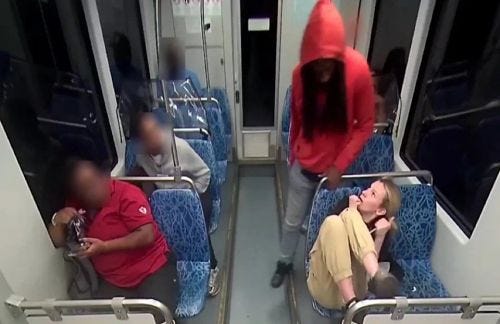House Democrats SILENT After Brutal Charlotte Murder
The prioritization of ideology over consistent protection of public safety by the judicial system always brings to the public attention those judges who lack the backbone to do the right thing
via TargetLiberty (excerpt)
House Democrats’ silence after a Ukrainian refugee is killed by a repeat offender on a Charlotte train exposes a double standard in political outrage and raises urgent questions about public safety under progressive crime policies.
Story Snapshot
House Democrats who condemned Daniel Penny are notably silent after Iryna Zarutska, a Ukrainian refugee, was fatally stabbed by a repeat offender in Charlotte.
Both the Charlotte and NYC subway cases involved homeless men with extensive criminal histories attacking or threatening passengers on public transit.
Federal investigations have been launched into the Charlotte stabbing and broader transit safety failures.
The muted response from former vocal lawmakers has fueled accusations of selective outrage and policy inconsistency.
Contrasting Political Responses to Transit Violence
The fatal stabbing of Iryna Zarutska, a 23-year-old Ukrainian refugee, on a Charlotte light rail train by Decarlos Brown Jr., a homeless man with a lengthy criminal record and diagnosed schizophrenia, has reignited fierce debate over crime and public safety.
Critics point out that House Democrats, previously outspoken in the 2023 Daniel Penny case in New York City, have offered little to no comment following Zarutska’s murder.
In the Penny case, a Marine veteran restrained Jordan Neely - a homeless man with a violent history - resulting in Neely’s death and widespread condemnation from progressive lawmakers.
The starkly different responses have led to allegations of political double standards, raising concerns among many Americans about the prioritization of ideology over consistent protection of public safety.
The Charlotte case stands out because both the victim and perpetrator represent groups often at the center of policy debates:
Zarutska, a recent refugee, and Brown, a repeat offender with severe mental illness who had been released earlier in 2025 under cashless bail reforms.
The silence from major House Democrats - who called Penny’s actions a “lynching” and demanded justice in 2023 - has not gone unnoticed by the public.
Only sparse, noncommittal statements or expressions of condolence have been issued, with no calls for policy accountability or reform.
This discrepancy has fueled frustration among those who see a pattern of selective outrage, especially when tragic outcomes stem from lenient criminal justice policies and inadequate mental health interventions.
Crisis of Public Safety and Policy Failures
Public safety on mass transit has become an acute concern in cities like Charlotte, where homelessness, mental illness, and repeat offenses intersect with broader policy decisions.
The rise of violent incidents involving individuals with extensive criminal and psychiatric histories is closely linked to recent bail reforms and reduced incarceration for nonviolent offenses - measures championed in Democrat-led cities.
Brown’s release in January 2025 under cashless bail, …



